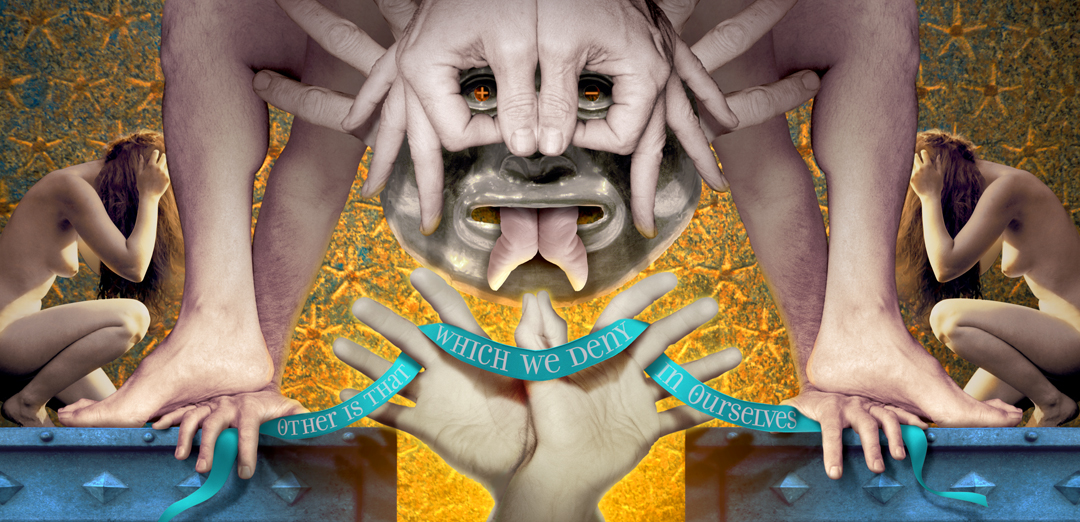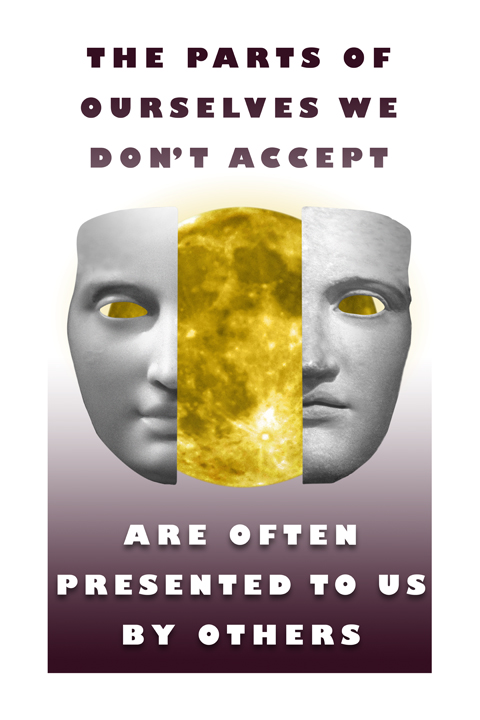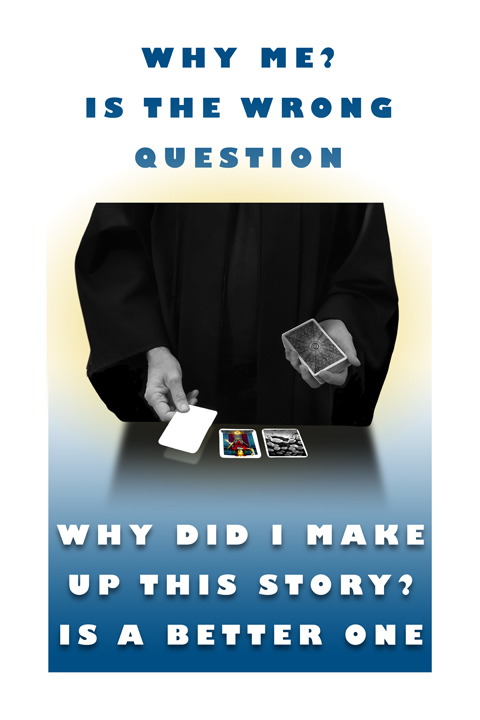
Digital illustration by Charlie Lemay.
This week, Venus makes its interior conjunction to the Sun in Scorpio. Said in plain terms, Venus is passing between the Earth and the Sun, and Friday, all three bodies align and form a conjunction.
We’ll be at the peak of Venus retrograde, in a year dominated by the retrogrades of personal planets. Sex and gender being such focused issues this year makes a good case for the validity of astrology.

Digital illustration by Charlie Lemay.
What we have with Venus in Scorpio is Venus in a condition known as detriment.
This is an ancient term, one of the "essential dignities" of classical astrology (which include rulership, exaltation, triplicity rulership, term, face, detriment and fall). Just about all astrology fans have heard of the first two (the Moon rules Cancer and is exalted in Taurus, for example). Most astrology students have heard of a few others.
Detriment is often thought of as a debility. I think of it as a special condition that can act as a stimulant or irritant, which brings out some of the deeper qualities. I think of detriment and fall as working like Chiron: as an inconvenient benefic (borrowing a phrase from Al Morrison, one of the early Chiron pioneers).
Anything emerging now (whether in the news or our personal experience) is a potential candidate for such a property. Yet there is also a psychological or emotional potential to this condition, which involves taking responsibility for what you feel.
Here’s how I described it in this week’s Scorpio horoscope:
The essence is taking ownership of something you thought belonged to someone else. There are different ways to describe this — such as "calling in a projection." This is not an easy concept to understand, though the simplest way to say it is being accountable for feelings that you thought belonged to someone else, or that you assigned to someone else when they were really yours. It’s about doing something that is most definitely not in style right now, which is being fully responsible for what you feel, for how you perceive the world, and for understanding your own motives.
This is not necessarily "comfortable." It’s also not a major psychological feat to use what used to be called "I statements," such as "I feel," "I think," "I believe," "I observe," and so on; however, today this is on the level of the triathlon.
We live in the age when the popular thing to do is blame everyone and everything for how one feels. We are all supposed to be a walking comfort zone for everyone else. Call me old-fashioned, but I don’t get it.
Yes, we all get moody and feel disappointed, about some things, some of the time. I get holding people responsible for what they actually do, such as intentionally provoking someone, or ditching an important commitment.
Yet we’ve been carried well past that, drawn out to sea by some strange emotional riptide. Unlike the 1970s, when there were solid self-help books coming out, and a lot of people were in therapy and group therapy and EST, reasoning directed toward a sense of personal accountability seems to be nonexistent.

Digital illustration by Charlie Lemay.
There are times when someone is "made to feel" something, but not most of the time, and certainly not all of the time. Part of our problem is that we exist in an inside-out reality of the digital age, which is like living in a home where all the walls are mirrors reflecting other mirrors.
Actually that would be more helpful, because at least when you’re looking at a mirror, you know what it is.
When a person says someone "made them feel" a certain way, it’s a bit subtler. Yet this is doomed to fail, if only because nothing can "make you feel" better except for you.
The challenge of this process, though, is indicated by an unusual feature in the Venus-Sun conjunction, which is at 3+ Scorpio: it’s exactly opposite the Chiron discovery degree, 3+ Taurus. This degree is like a permanently situated Chiron (discovered, by the way, on Nov. 1, 1977, a time which has some unusual distinction for most people).
Venus opposite Chiron hints at a kind of "catastrophobia," which seems understandable enough for our moment in history. Yet we do a lot to provoke it.
Sun opposite Chiron suggests a power struggle over injuries typical to men and fathers: the sense of emasculation, lack of fulfillment, or a struggle to be self-expressive (which is often the essence of what drives someone to be an artist).
Retrograde Venus-Sun in Scorpio opposite symbolic Chiron is anything but a comfort zone. And I would argue that the particular kind of comfort implied ("safe space," being coddled, expecting the world to move over without a discussion, being told you’re right when you’re wrong, and many other manifestations) is the very last kind that we need.
Growth is often uncomfortable, which keeps us moving through the process. Right now, we could do a lot of growing by admitting to what we feel, and claiming responsibility for it. That will work, especially if you want to feel better. Anyone who has succeeded at coming out the other end of a challenging transit knows that this is a singularly beautiful experience.


Bless you for this wonderful piece, dear Eric. So very helpful. ((()))
I posted this on my LinkedIn & Twitter accounts yesterday, it appears to align well with the astrology this week per above…
Some of us learn how to love well…from being loved well. Some of us, a lot of us really, learn how to love well…from not being loved well.
Which provides us a choice, an opportunity to make – and live by – this conscious decision…will we focus on not being loved well? Or, will we recognize the fact that regardless of the “how” or the “why,” indeed we have learned a lot about how to love well…
…and now we choose to focus our time, energy, and attention on loving well and creating the relationships that will provide us the opportunity to be loved well?
The choice is ours. However, only one choice serves both me…and humanity.
Beautiful Grace!
And it all starts with loving our self WELL.
Happy FullMoon everybody
Oups… i lost my KGrace
The notions of the couple and the sacred marriage held a very important place in ancient Chinese religious thinking. Every sacred power was twofold, male and female; but since only one half of the sacred couple was generally enclosed in any one sanctuary, the ritual was directed at reconstituting the whole… The complete being is male and female; since most men neglect or repress their feminine nature, they are out of balance; their male aggressiveness comes to the fore, and their whole vitality suffers. There can be no true Holiness without a prior revitalisation of femininity.
M. Kaltenmark –Lao Tzu and Taoism
So what’s new? Well, perhaps gender fluidity ? I feel that now not only is there a need for a ‘revitalisation of femininity’, but that for people of all genders maintaining equilibrium between the feminine and the masculine is a requirement for being grounded and centred. I choose to believe that almost anything can be built on a secure and stable foundation; for example Analemma Tower is really, literally, out there. I’m also a great fan of ‘top-down’ technologies because, ‘why not’?
https://www.newscientist.com/article/mg15020363-400-technology-top-down-building-big-in-japan/
Mind, Hanging Gardens of Babylon?
And some music. Because for me, everything is better with music. https://www.youtube.com/watch?v=8UY9q5qYwRI